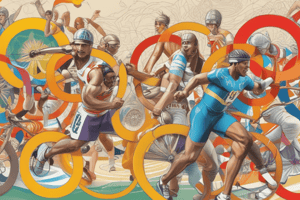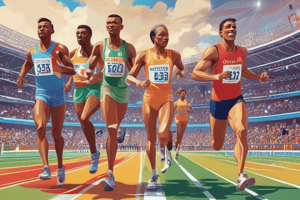Podcast
Questions and Answers
Who is credited with founding the modern Olympic movement?
Who is credited with founding the modern Olympic movement?
- Baron Pierre de Coubertin (correct)
- An English public school sports coach
- An ancient Greek philosopher
- A French athletic commissioner
Where was the first Olympic Games held in 1896?
Where was the first Olympic Games held in 1896?
- Paris, France
- Berlin, Germany
- Athens, Greece (correct)
- London, England
What was the original purpose of the Olympic Games according to de Coubertin?
What was the original purpose of the Olympic Games according to de Coubertin?
- To generate revenue for participating countries
- To celebrate and strengthen the physical, mental, and cultural qualities of humanity (correct)
- To create a more competitive sports atmosphere
- To promote international athletic competition
What was the basis for de Coubertin's model for sports events in the Olympic Games?
What was the basis for de Coubertin's model for sports events in the Olympic Games?
Why was adherence to the amateur rule important to de Coubertin?
Why was adherence to the amateur rule important to de Coubertin?
What is the underlying philosophy of Olympism based on?
What is the underlying philosophy of Olympism based on?
What did de Coubertin envision creating through the Olympic movement?
What did de Coubertin envision creating through the Olympic movement?
What is a current debate surrounding the modern Olympic Games?
What is a current debate surrounding the modern Olympic Games?
The modern Olympic Games were first held in 1900.
The modern Olympic Games were first held in 1900.
Baron Pierre de Coubertin was a French nobleman who founded the modern Olympic movement.
Baron Pierre de Coubertin was a French nobleman who founded the modern Olympic movement.
The Olympic Games were initially intended to be a commercial event for athletes.
The Olympic Games were initially intended to be a commercial event for athletes.
The philosophy of Olympism emphasizes the joy of physical and mental effort.
The philosophy of Olympism emphasizes the joy of physical and mental effort.
De Coubertin modeled the sports events after the French public school system.
De Coubertin modeled the sports events after the French public school system.
The original intent of the Games was strictly to promote athletic competition without cultural aspects.
The original intent of the Games was strictly to promote athletic competition without cultural aspects.
Debates regarding adherence to de Coubertin's original intent still exist today.
Debates regarding adherence to de Coubertin's original intent still exist today.
The amateur rule was considered less important in de Coubertin's time compared to today's doping regulations.
The amateur rule was considered less important in de Coubertin's time compared to today's doping regulations.
Flashcards are hidden until you start studying
Study Notes
History of the Modern Olympic Games
- Began in the late 19th century as a revival of ancient Greek Olympics.
- Founded in 1894 during the International Athletic Congress in Paris.
- The first Olympic Games were held in Athens, Greece, in 1896.
Baron Pierre de Coubertin
- Frenchman who envisioned the modern Olympic movement.
- Aimed to create an international sports event that blended sport with culture, tradition, and education.
- Believed in celebrating physical, mental, and cultural qualities of humanity.
Philosophy of Olympism
- Focused on joy in physical and mental effort.
- Emphasized respect for universal ethical principles.
- Sought to create a more noble and empathetic humanity through sports.
Sports Model and Ideals
- Modeled events after the English public school sport system.
- Valued qualities such as camaraderie, nobility, and honesty in sports.
- Advocated for amateurism; believed sports should not be a commercial pursuit.
Evolution of the Olympics
- Grew to become the largest international festival.
- Present-day debates concerning adherence to de Coubertin’s original vision.
- International nature aligns with Coubertin’s goals, but issues such as commercialism, politics, and drug use have emerged.
Legacy and Impact
- Olympics possess potential to foster understanding and peace globally.
- Ongoing discourse regarding the balance between Olympic ideals and current realities.
History of the Modern Olympic Games
- Began in the late 19th century as a revival of ancient Greek Olympics.
- Founded in 1894 during the International Athletic Congress in Paris.
- The first Olympic Games were held in Athens, Greece, in 1896.
Baron Pierre de Coubertin
- Frenchman who envisioned the modern Olympic movement.
- Aimed to create an international sports event that blended sport with culture, tradition, and education.
- Believed in celebrating physical, mental, and cultural qualities of humanity.
Philosophy of Olympism
- Focused on joy in physical and mental effort.
- Emphasized respect for universal ethical principles.
- Sought to create a more noble and empathetic humanity through sports.
Sports Model and Ideals
- Modeled events after the English public school sport system.
- Valued qualities such as camaraderie, nobility, and honesty in sports.
- Advocated for amateurism; believed sports should not be a commercial pursuit.
Evolution of the Olympics
- Grew to become the largest international festival.
- Present-day debates concerning adherence to de Coubertin’s original vision.
- International nature aligns with Coubertin’s goals, but issues such as commercialism, politics, and drug use have emerged.
Legacy and Impact
- Olympics possess potential to foster understanding and peace globally.
- Ongoing discourse regarding the balance between Olympic ideals and current realities.
Studying That Suits You
Use AI to generate personalized quizzes and flashcards to suit your learning preferences.




